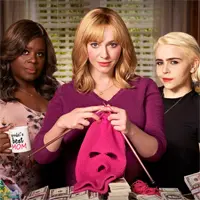Why women are the stars of TV's best dramedies
-

Shows like Good Girls, Insecure, Fleabag, Dead to Me and Russian Doll each tackle serious issues with comedy. So did their Jenji Kohan-created predecessors, Weeds and Orange Is the New Black. "Even more impressive? They all do it while centering the experiences of their female stars," says Jessica Toomer. The success of The Sopranos, Toomer adds, "led to an influx of TV shows that traded in the same trope: bad men behaving badly. These shows won Emmys, they catapulted to the top of the ratings, they cemented cable networks’ place atop the hierarchy of narrative TV — but they were also grave affairs, preferring a more sobering style of storytelling that leaned on extreme violence, ethical conundrums, and corrupt motives to give them an air of gravitas they knew would strike a chord with awards show voting bodies. These were serious shows about men doing seriously awful things that rarely had time to suss out the complicated character arcs of their supporting female cast. Which was fine back when audiences were told only 'likable' women could succeed on TV. Fortunately, a new crop of women-centered dramedies has arrived that have taken the idea that only men can misbehave and they’re putting it through the proverbial meat grinder. But, instead of delivering dour character studies set to the backdrop of gritty crime thrillers and politically charged fantasy series, these genre-bending shows are toeing the line, existing in the same in-between spaces that women have historically occupied. They teeter between comedy and drama, balancing and employing both motifs to give us a different kind of anti-hero — one that’s female, yes, but also infinitely more relatable, often incredibly sympathetic, and more illuminative when it comes to the complexity of the human condition. There are a couple of reasons why women seem to be running the dramedy game. The first is just basic necessity. For decades, prestige dramas put male characters on an unreachable pedestal, at least during awards season. Testosterone-fueled sagas that dabbled in Machiavellian dynamics between crooked cops, oppressed gangsters, grizzled lawmen, Western outlaws, and scheming politicians were the stories lauded by critics, held up as shining examples of what the Peak TV era could accomplish now that streaming had come along. Women could be funny, or they could be put-upon centerpieces within those sagas, but they could rarely be both. And men? Well, murdering the girlfriend of your strung-out, meth-dealing business partner and negotiating hostile takeovers of world governments while pushing journalists into oncoming subway trains didn’t leave much room for them to set up a punch-line. The only way for female characters and the actresses who played them on TV, to get recognized was to start carving out their own niche — one that took very real stakes and approached them with the kind of bleak, black humor that felt authentic."
TOPICS: Good Girls, Dead to Me, Insecure, Orange Is the New Black, Russian Doll, Weeds, Peak TV, Women and TV
More Good Girls on Primetimer:- Christina Hendricks says NBC failed in marketing Good Girls: "It was quirky and weird and smart and they kind of made it just look like a sitcom"
- Good Girls ends on a low note
- TV Today: Good Girls Ends Its Four-Season NBC Run, Storylines Dangling
- NBC reteams with Good Girls creator Jenna Bans on Redrum, another dark thriller dramedy about female friends
